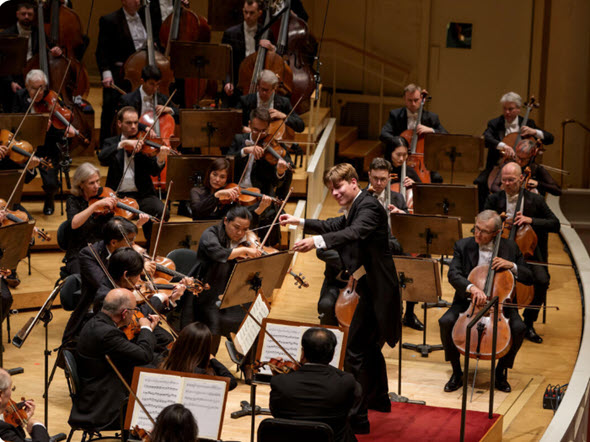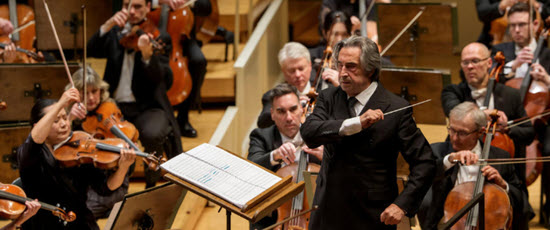
Commentary: A singular linearity has defined Riccardo Muti’s many seasons and concerts with the Chicago Symphony Orchestra: What you expect – the conductor’s distinctive sensibility coupled with a supreme level of musical performance answered by ripping ovations – is what you get. But Muti’s recent two-week stint with the CSO shattered the rule. By turns brilliant and humdrum and just bizarre, these concerts swung from exhilarating highs to curious lows, all of it mirrored in audience responses of familiar acclaim and mere politesse.
Read the full story »Classical + Opera »
Electric Berlioz experience confirmed Mäkelä as CSO’s ideal choice to bear new-era banner
Commentary: Klaus Mäkelä’s “Harold in Italy” and “Symphonie fantastique” stamped his coming Chicago Symphony directorship
By Lawrence B. Johnson
In the wake of Klaus Mäkelä’s resonant first appearance of the season, a spectacular all-Berlioz program Oct. 16-18, the Chicago Symphony Orchestra throttles back with a bit of chamber theater Oct. 23-25: Stravinsky’s “The Soldier’s Tale,” together with other down-sized Stravinsky pieces. Good idea, as it turns out. Everyone needs to catch their breath.
Mäkelä’s turn through Berlioz’s masterpieces “Harold in Italy,” a grand-scaled tone poem with solo viola, and the “Symphonie fantastique” was nothing short of epic. After hearing the first performance, I went back to catch the third. What I heard was unequivocal: In Mäkelä, who becomes the Chicago Symphony’s next music director in September 2027, when he will be 31, the orchestra has landed exactly the brilliant, charismatic, youthful and bold figure needed to forge the next great era at Orchestra Hall. Read the full story »
Enduring power of Verdi’s Requiem felt anew
in Muti’s fierce production with CSO, Chorus
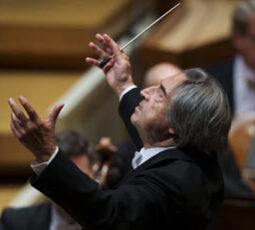
Commentary: Is there a more riveting manner in which the Chicago Symphony Orchestra and Chorus could have closed out its 2024-25 season at Orchestra Hall? Not from where I sit: The 1874 Requiem Mass of Giuseppe Verdi – conducted by perhaps its greatest living interpreter in Riccardo Muti and boasting a superb quartet of solo singers in addition to the fiery CSO and Chorus – resounded June 19-24 to cap Muti’s two-week return to the podium, at a moment of global instability so fraught that the Bulletin of the Atomic Scientists re-set the world’s iconic Doomsday Clock at 89 seconds to Midnight.
Amid CSO’s run of Mahlermania, Mäkelä leads side trip to vibrant Dvořák Seventh Symphony
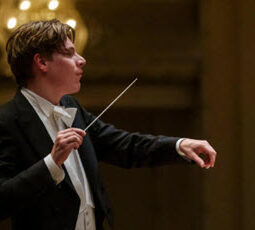
Commentary: It’s Mahler, Mahler everywhere and almost all the time these days at Orchestra Hall as the Chicago Symphony Orchestra gears up for its appearance in an international festival in Amsterdam from May 9-18 that will spotlight five major orchestras performing the complete Mahler symphonies at the venerable Concertgebouw. In midstream of the CSO’s Mahler madness, music director-designate Klaus Mäkelä led a roundly rewarding account of Dvořák’s Seventh Symphony, a performance at once glittering and searching, finely integrated and marvelously freewheeling.
Ax’s masterly recital of Beethoven, Schumann pointed up rare worth of Chicago piano series

Commentary: In elegant, illuminating and distinctly individual fashion, Emanuel Ax’s recent recital at Orchestra Hall exemplified everything that is marvelous about the annual piano series under the banner of Symphony Center Presents. Season after season, this longstanding treasure of a series brings to Chicago the greatest pianists of our time. Ax has been part of that parade for quite a while; likewise, Evgeny Kissin, who is next up May 11. The 2025-26 piano series opens with Yunchan Lim, winner of the 2022 Van Cliburn Competition.
A conductor quietly rising into first echelon: Karina Canellakis’ bravura night with the CSO

Commentary: Karina Canellakis may be the most accomplished conductor not on everyone’s lips, a plausible American successor to Leonard Bernstein and Michael Tilson Thomas. Such was the impression Canellakis left after her second appearance with the Chicago Symphony Orchestra in concerts April 3-5. She is a huge talent, at age 43 widely and significantly tested, albeit in an oddly quiet way.
Jakub Hrůša’s rare moment at Orchestra Hall captured Chicago Symphony’s bright outlook

Commentary: Conductors hardly ever address their listeners. While they may press hands to heart or wave goodnight, they seldom speak. But after leading the Chicago Symphony Orchestra in a stupendous performance of Shostakovich’s Symphony No. 11 on March 22, Czech conductor Jakub Hrůša raised his hands to quiet a roaring audience at Orchestra Hall. He had something to say that mattered to him.
Shape-shifting Civitas Ensemble, as foursome, reveals buried gem in music of French woman

Commentary: How pleasantly disorienting, to sit in the choir loft rimming the Orchestra Hall stage and gaze down on a handful of Chicago Symphony musicians with pianist Winston Choi. But that’s Civitas Ensemble, consistently defying expectations: The program opened with piano quartet by the pathbreaking “Mel” Bonis, a 19th-century French composer about a century ahead of her time.
Nearly 70 years in, Chicago Symphony Chorus gives grand first airing of Haydn C major Mass
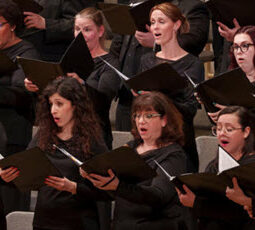
Commentary: Not the least remarkable aspect of the Chicago Symphony Orchestra and Chorus’ splendid performance of Haydn’s Mass in C major (“Mass in Time of War”) on March 13 was the simple fact the these forces had never before undertaken the work, a masterpiece that stands at the core of the choral repertoire. It’s almost unimaginable that the chorus created by Fritz Reiner and Margaret Hillis back in 1957 hadn’t gotten around to Haydn’s grand Mass in three generations! So consider this belated CSO premiere, conducted by Manfred Honeck, with the chorus well prepared by guest director Donald Nally, a proper fix.
Amid new CSO season’s glittering prospects, concert highlights are mined by the scoopful
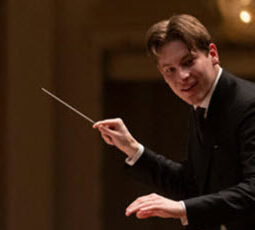
Commentary: How rich, how embracing and inviting, are the Chicago Symphony Orchestra’s newly bruited plans for the 2025-26 season? I went through the detailed chronology of subscription programs to highlight a dozen. Then, after making some hard choices, I counted my picks. There were 20. Music director-designate Klaus Mäkelä will lead four programs and take the orchestra on an eastern tour. I’ve been reporting on orchestra seasons for half a century. I don’t recall a horizon more enticing than the CSO’s lineup for the season ahead.
In stellar concert with Finnish conductor, CSO extends an impressive string of performances
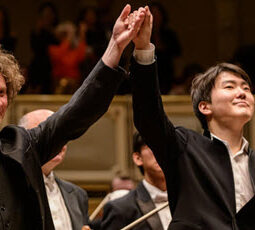
Review: On a weeks-long run of concerts memorable for the performances of conductors and soloists alike, to say nothing of the orchestra itself, the Chicago Symphony fashioned one of the most brilliant nights in recent memory. The concert March 2 was doubly highlighted by the Finnish maestro Santtu-Matias Rouvali’s account of Sibelius’ Fifth Symphony and Korean pianist Seong-Jin Cho’s dazzling turn through Prokofiev’s Second Piano Concerto.
Romantic bounty shapes Orchestra Hall debut by Tchaikovsky and Gilmore winner Kantorow

Review: The French pianist Alexandre Kantorow at age 27 made a striking first impression in his Orchestra Hall recital Feb. 2, his debut in the formidable piano series under the aegis of Symphony Center Presents. The young French virtuoso, gold medalist of the 2019 Tchaikovsky Competition and winner of the Gilmore Artist Award in 2024, is a pianistic lion as serious as he is prodigious. His program here was an exercise in grandiose Romanticism, an imposing display of technical wizardry, a veritable summation of keyboard virtuosity.
In concerts brilliant and grand, Muti showed why he still waves magic wand over the CSO
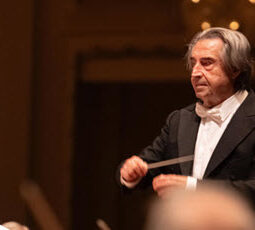
Review: Officially, conductor Riccardo Muti holds the distinction of music director emeritus for life with the Chicago Symphony Orchestra. But after the 83-year-old maestro’s two-week season debut concerts at Orchestra Hall, it seems more apt to acknowledge him as the band’s artistic patriarch. When Muti’s on the podium, the CSO rises to its proper level. It glistens.
CSO finale’s convergence of three young stars signaled new energy heading into Mäkelä era
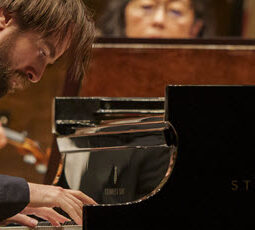
Commentary: The Chicago Symphony Orchestra’s 2023-24 season, just ended at Orchestra Hall, has been the most electrifying in recent memory. The 123-year-old ensemble, founded in 1891, opened its season with a fabulous triumph of octogenarians. And yet the vibe has been distinctly young: The orchestra capped its season on June 24 with the local premiere of a new piano concerto by another highly popular composer, Mason Bates, also known as DJ Masonic. Bates was appointed by Muti as CSO composer in residence back in 2010.
Haymarket Opera closes out its spring season with early Handel oratorio ‘La Resurrezione’
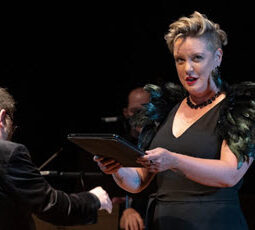
Review: Rarities, albeit not exactly operatic, have filled Haymarket Opera Company’s spring season – in March the first performance in 300 years of Maria Margherita Grimani’s 1715 melodrama “The Beheading of John the Baptist” (or “La decollazione di San Giovanni Battista”) and on June 14 an oratorio from Handel’s youthful Italian sojourn, “La Resurrezione.” The latter brought two unusual moves by Haymarket, the importation of someone other than founding artist director Craig Trompeter to conduct and a visiting star turn by Chicago violin virtuoso Rachel Barton Pine as concertmaster and spotlighted soloist.
In concerto ‘The Elements,’ CSO and violinist mined the potential of composer partnerships
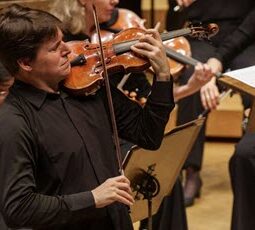
Review: Premieres in the classical music world are too often one and done – works that don’t gain enough traction to compensate for the tremendous amount of time and energy that goes into their incubation and mastery. But violinist Joshua Bell’s ambitious five-composer, five-movement violin concerto with epilogue, “The Elements,” which received its Midwest premiere by the Chicago Symphony Orchestra on June 13,involved such a smart, systematic and widely collaborative approach that it would well serve as the blueprint for similar endeavors.
A valedictory for percussion caps CSO tenure of composer in residence Jessie Montgomery
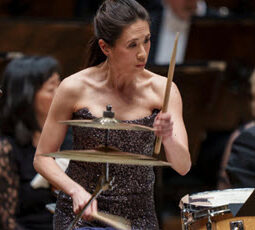
Review: A notably productive chapter in the Chicago Symphony Orchestra’s composer-in-residence program came to a splendid, and certainly resonant, close last weekend with the world premiere of Jessie Montgomery’s “Procession” for percussion and orchestra. It was nothing short of a bang-up success.
Neeme Järvi, elder statesman on the podium, leads CSO in Mahler 2nd of intimate grandeur
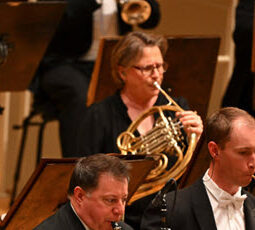
Review: It’s surely unusual to begin a concert review with a statement of full disclosure. But I feel duty-bound to note that I go back a long way with the Estonian conductor Neeme Järvi, who led the Chicago Symphony Orchestra in a transcendent performance of Mahler’s Second Symphony at Orchestra Hall on the memorable evening of May 23. I found this latest encounter singularly touching and as thrilling as that packed house obviously did.
Pianist Kissin, cheering throng of enthusiasts renew an annual celebration at Orchestra Hall
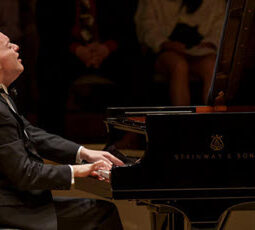
Review: Pianist Evgeny Kissin’s annual recitals in Chicago are unlike any other musical performance in the year at Orchestra Hall. When Kissin shows up, well, so does everybody else. These are not concerts, but Events. Witness the 52-year-old pianist’s latest appearance on May 19: Not only was the hall jam-packed, including the choral terrace, but three rows of tiered onstage seating immediately behind the piano also were filled end to end. Kissin is manifestly Chicago’s favorite visiting virtuoso, and for good reason. He may well be the greatest pianist in the world, and he never disappoints.
Meeting of minds in music of finesse: German pianist, Japanese maestro convene with CSO
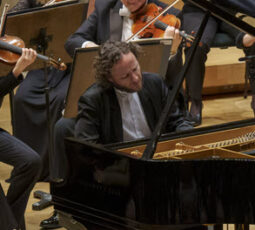
Review: In a performance of rare beauty that set the mind racing in several directions, German pianist Martin Helmchen, Japanese conductor Kazuki Yamada and the Chicago Symphony Orchestra brought patches of human history to life at Orchestra Hall over the weekend of May 16. Too often in concert halls, big sound is understood as the measure of importance, but right away at this CSO event one felt irresistibly drawn by the whispers and the need to lean in.
When Chicago Symphony went small, intimate with Mozart and Stravinsky, impact went deep
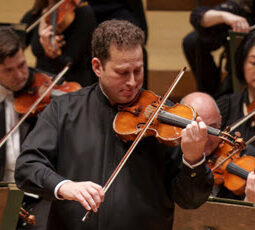
Commentary: In its small-scale fashion, last weekend’s Chicago Symphony Orchestra program with conductor-violinist Nikolaj Szeps-Znaider was the sleeper delight of the season thus far. To say it was a half-orchestra affair might be generous. Compared with the forces arrayed on stage at Orchestra Hall for Rimsky-Korsakov’s “Scheherazade” the week before, the diminutive band assembled around Szeps-Znaider barely filled the dimensions of a chamber orchestra. But what a sound that handful of musicians made, and what a display of style, polish and wit.
In fan-tastic fantasy weekend, CSO serves up ‘Scheherazade,’ sci-fi film ‘Close Encounters’
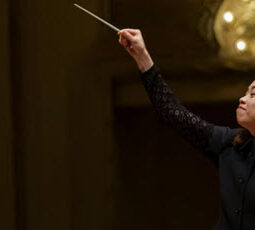
Review: On Thursday and Saturday nights, May 2 and 4, the fare was exotic classicism, Rimsky-Korsakov’s “Scheherazade,” spotlighting both the Chicago Symphony Orchestra debut of conductor Elim Chan and the bewitching solos of associate concertmaster Stephanie Jeong. On Friday night and Sunday afternoon, all eyes were on the big screen suspended over the orchestra for a showing of director Steven Spielberg’s 1977 sci-fi charmer “Close Encounters of the Third Kind,” with the CSO providing John Williams’ indispensable musical score live.
Bavarian orchestra’s dark, edged Mahler Sixth bespeaks ascendant composer of modern era

Review: The Sixth Symphony calls for an expanded orchestra with double woodwinds, eight French horns, two harps and a percussion group that famously includes a giant sledgehammer. Like conductor Simon Rattle, who led without a score, the Bavarian Radio Symphony Orchestra’s performance April 28 at Orchestra Hall displayed a collective mastery of this complex music to its core – its heavy tread and its lightness of being, its massive sonorities and its consummate finesse.
Andrew Davis, conductor and scholar, led
opera and life with an imperishable twinkle
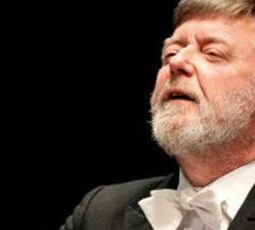
Remembrance: The last time I interviewed conductor Andrew Davis, in 2021, he was as I shall always think of him: soft-spoken, thoughtful, articulate, self-effacing, an undemonstrative intellectual with a wry spirit and a mischievous twinkle in his eyes that lit up his whole being. Of the many testimonials and tributes I’ve read about Davis since his death from leukemia on April 20 at age 80, the one I think he would have liked best was the succinct observation of Jeff Alexander, president of the Chicago Symphony Orchestra, that the British-born conductor possessed “good wit.”
CSO and Chorus offer Mendelssohn’s ‘Elijah’: Polished sound, but scant fury, signifying little

Review: Under the baton of James Conlon, the Chicago Symphony Orchestra and Chorus presented “Elijah” in performances April 11-13, of which I heard the last. Like the oratorio on its surface, which is to say in its entirety, what I heard was altogether above reproach. The only question was why it was undertaken at all.
Klaus Mäkelä is named CSO music director; Finnish conductor to succeed Muti in 2027

Report: Finnish conductor Klaus Mäkelä, 28, whose meteoric rise on the international concert scene has electrified audiences and elicited rapturous critical praise, was named April 2 as the 11th music director of the Chicago Symphony Orchestra. The appointment will put Mäkelä in charge of two of the world’s preeminent orchestras, starting simultaneously in September 2027 when his Chicago directorship will be twinned with his new post as principal conductor of Amsterdam’s Royal Concertgebouw Orchestra.
Baroque bounty: Haymarket revives oratorio, Bella Voce turns spotlight on its band Sinfonia

Commentary: If you know where to look, and you don’t have to look far, you’ll find Baroque music so well served in Chicago that our musical locus can sometimes feel like Venice, Leipzig or London in the early 1700s. On recent consecutive nights, the ever-enchanting Haymarket Opera offered what was apparently the first performance in 300 years of Maria Margherita Grimani’s 1715 melodrama “The Beheading of John the Baptist” (or “La decollazione di San Giovanni Battista”), and the splendid vocal ensemble Bella Voce showcased its instrumental component Sinfonia in its first stand-alone concert. The adjacent events, March 22-23, conjured an aura of subtle riches.
As Lyric Opera emerges from challenging era, Anthony Freud winds up 13-year run at helm
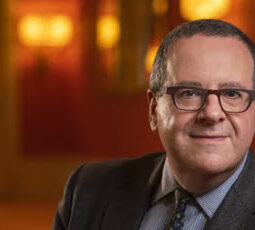
Interview: With Anthony Freud’s announcement that he will depart the Lyric Opera of Chicago as its general director in July of this year, a significant transition in one of the Windy City’s leading arts institutions is upon us. “I feel great about the company, the strength of the institution from which I’m retiring,” said Freud at a recent sit-down interview in his office on the fourth floor of the Lyric Opera House. “I’m proud of the way we have evolved through challenging times. I think the work that we do is exciting, thought-provoking, innovative, and surprising in many ways.”
With word waiting on next CSO music director, Jakub Hrůša leads a spectacular ‘Zarathustra’

Review: Even in a Chicago Symphony season that has produced an array of memorable concerts, the March 14 program with conductor Jakub Hrůša is likely to stand out for a long time to come. The virtuosic pairing of Strauss’ “Also sprach Zarathustra’ with Bartók’s suite from “The Miraculous Mandarin” was at once a reminder of the CSO’s comprehensive brilliance and a testament to Hrůša’s extraordinary prowess.
‘Matchbox Magic Flute’ at Goodman Theatre: Mozart’s opera spun afresh in a whimsical key
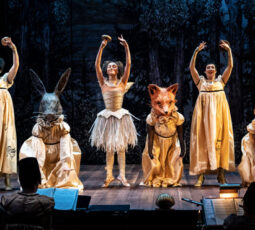
Review: Director Mary Zimmerman’s take on Mozart’s opera “The Magic Flute” at Goodman Theatre falls somewhere between the work’s original conception as a singspiel, literally a sung play, and a sort of heedless “Hey, guys, let’s put on a musical.” Only here and there does it get its chin above the opera bar, and yet it is altogether delightful, a rambunctious good time. And it has one of the best dragons ever. ★★★★
Diverse styles on display in MusicNOW series reflect rich, complex cultural stew of Chicago
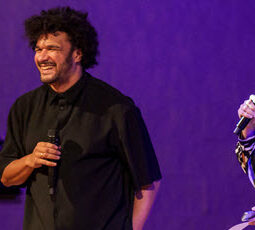
Commentary: At yet another of its fascinating new-music concerts this season, the Chicago Symphony Orchestra’s MusicNOW event on March 3 ‒ conceived by the orchestra’s composer-in-residence Jessie Montgomery ‒ put me in mind, improbably enough, of Mozart, whose music overflowed with the influences of all he experienced in his travels through the cosmopolitan centers of Europe. Chicago is, absolutely, such an invigorating place to be.
Chicago Symphony gets $21M Negaunee gift for education, wide range of other programs

Review: The Chicago-based Negaunee Foundation, a longtime donor of major grants to the Chicago Symphony Orchestra and its diverse educational program, has made a new $21 million gift to the Chicago Symphony Orchestra Association. It is one of the largest single donations the CSO has ever received.
Recent Posts
- Amid familiar brilliance of Muti CSO concerts, Brahms (on bizarre night) got lost in shadows
- Electric Berlioz experience confirmed Mäkelä as CSO’s ideal choice to bear new-era banner
- Enduring power of Verdi’s Requiem felt anew
in Muti’s fierce production with CSO, Chorus - Amid CSO’s run of Mahlermania, Mäkelä leads side trip to vibrant Dvořák Seventh Symphony
- Ax’s masterly recital of Beethoven, Schumann pointed up rare worth of Chicago piano series
Most Commented
- Role Playing: Janet Ulrich Brooks on nailing the style of a wily Russian in 'A Walk in the Woods'
- Role Playing: City boy Michael Stegall ropes wild cowboy in Raven Theatre’s ‘Bus Stop’
- Role Playing: Sadieh Rifai zips among seven characters in one-woman ‘Amish Project’
- Role Playing: Kirsten Fitzgerald inhabits sorrow, surfs the laughs in ‘Clybourne Park’
- Role Playing: Brent Barrett’s glad he joined ‘Follies’ as that womanizing, empty cad Ben







